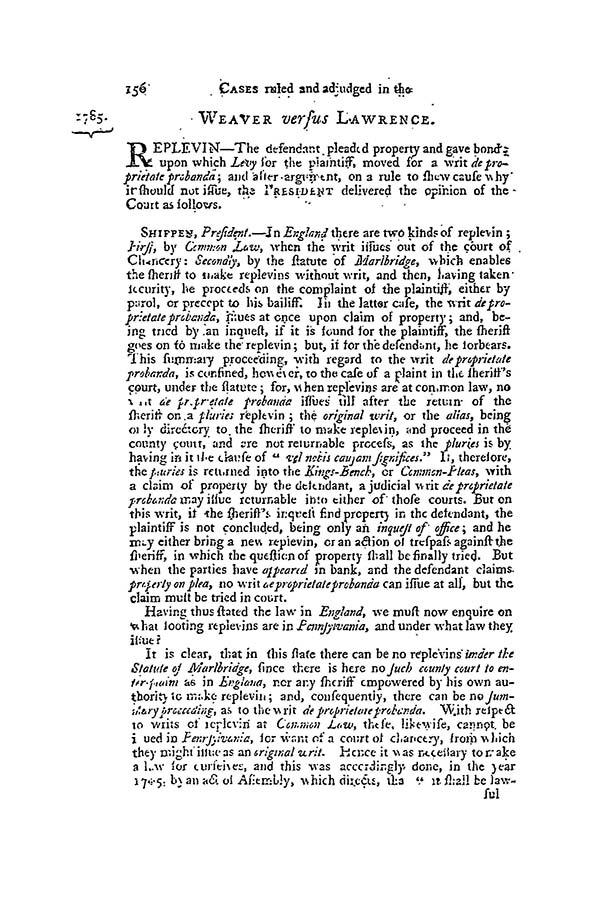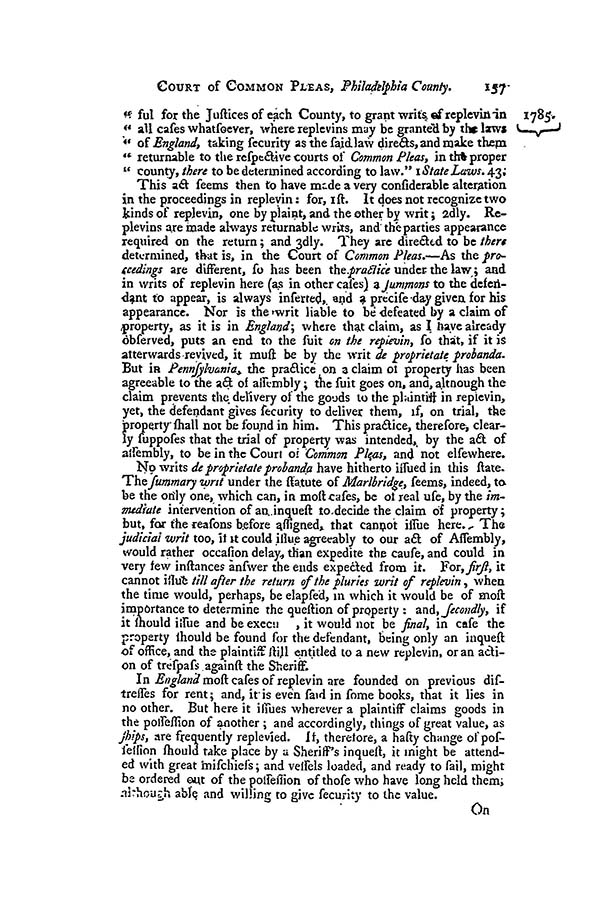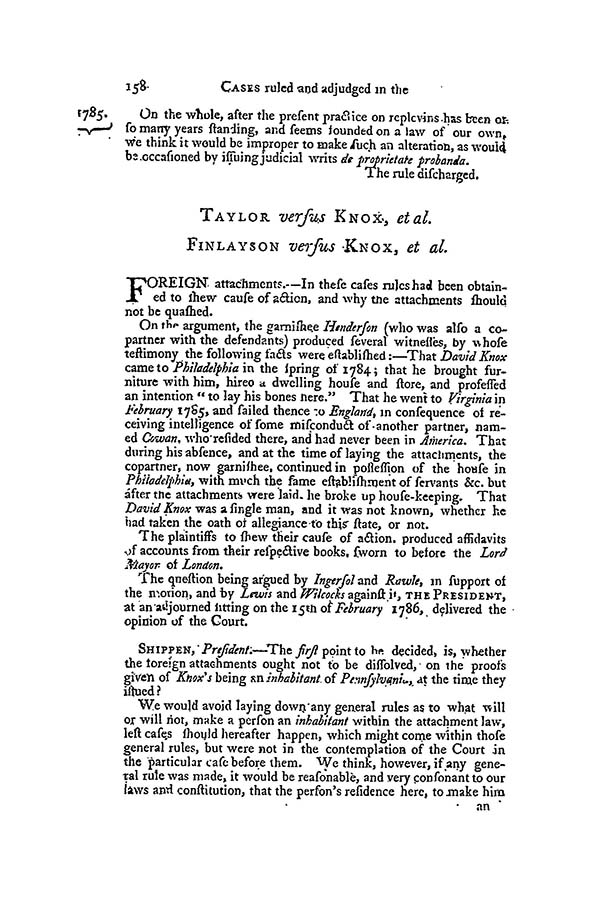Weaver v. Lawrence, 1 Dall. 156 (C. P. Phila. Cty. 1785)
Common Pleas, Philadelphia County.
December Term, 1785.
Weaver versus Lawrence.
Replevin—The defendant pleaded property and gave bonds upon which Levy for the plaintiff, moved for a writ de proprietate probanda; and after argument, on a rule to shew cause why it should not issue, the President delivered the opinion of the Court as follows.
Shippen, President—In England there are two kinds of replevin; First, by Common Law, when the writ issues out of the court of Chancery: Secondly, by the statute of Marlbridge, which enables the sheriff to make replevins without writ, and then, having taken security, he proceeds on the complaint of the plaintiff, either by parol, or precept to his bailiff. In the latter case, the writ de proprietate probanda, issues at once upon claim of property; and, being tried by an inquest, if it is found for the plaintiff, the sheriff goes on to make the replevin; but, if for the defendant, he forbears. This summary proceeding, with regard to the writ de proprietate probanda, is confined, however, to the case of a plaint in the sheriff's court, under the statute; for, when replevins are at common law, no writ de propretate probanda issues till after the return of the sheriff on a pluries replevin; the original writ, or the alias, being only directory to the sheriff to make replevin, and proceed in the county court, and are not returnable process, as the pluries is by having in it the clause of "vel nobis causam significes." It, therefore, the pluries is returned into the Kings-Bench, or Common-Pleas, with a claim of property by the defendant, a judicial writ de proprietate probanda may issue returnable into either of those courts. But on this writ, if the sheriff's inquest find property in the defendant, the plaintiff is not concluded, being only an inquest of office; and he may either bring a new replevin, or an action of trespass against the sheriff, in which the question of property shall be finally tried. But when the parties have appeared in bank, and the defendant claims property on plea, no writ de proprietate probanda can issue at all, but the claim must be tried in court.
Having thus stated the law in England, we must now enquire on what footing replevins are in Pennsylvania, and under what law they issue?
It is clear, that in this state there can be no replevins under the Statute of Marlbridge, since there is here no such county court to enter plaint as in England, nor any sheriff empowered by his own authority to make replevin; and, consequently, there can be no summary proceeding, as to the writ de proprietate probanda. With respect to writs of replevin at Common Law, these, likewise, cannot be issued in Pennsylvania, for want of a court of chancery, from which they might issue as an original writ. Hence it was necessary to make a law for ourselves, and this was accordingly done, in the year 1705 by an act of Assembly, which directs, that "it shall be law-
This act seems then to have made a very considerable alteration in the proceedings in replevin: for, 1st. It does not recognize two kinds of replevin, one by plaint, and the other by writ; 2ndly. Replevins are made always returnable writs, and the parties appearance required on the return; and 3rdly. They are directed to be there determined, that is, in the Court of Common Pleas.—As the proceedings are different, so has been the practice under the law; and in writs of replevin here (as in other cases) a summons to the defendant to appear, is always inserted, and a precise day given for his appearance. Nor is the writ liable to be defeated by a claim of property, as it is in England; where that claim, as I have already observed, puts an end to the suit on the replevin, so that, if it is afterwards revived, it must be by the writ de proprietate probanda. But in Pennsylvania, the practice on a claim of property has been agreeable to the act of assembly; the suit goes on, and, although the claim prevents the delivery of the goods to the plaintiff in replevin, yet, the defendant gives security to deliver them, if, on trial, the property shall not be found in him. This practice, therefore, clearly supposes that the trial of property was intended, by the act of assembly, to be in the Court of Common Pleas, and not elsewhere.
No writs de proprietate probanda have hitherto issued in this state. The summary writ under the statute of Marlbridge, seems, indeed, to be the only one, which can, in most cases, be of real use, by the immediate intervention of an inquest to decide the claim of property; but, for the reasons before assigned, that cannot issue here. The judicial writ too, if it could issue agreeably to our act of Assembly, would rather occasion delay, than expedite the cause, and could in very few instances answer the ends expected from it. For, first, it cannot issue till after the return of the pluries writ of replevin, when the time would, perhaps, be elapsed, in which it would be of most importance to determine the question of property: and, secondly, if it should issue and be executed, it would not be final, in case the property should be found for the defendant, being only an inquest of office, and the plaintiff still entitled to a new replevin, or an action of trespass against the Sheriff.
In England most cases of replevin are founded on previous distresses for rent; and, it is even said in some books, that it lies in no other. But here it issues wherever a plaintiff claims goods in the possession of another; and accordingly, things of great value, as ships, are frequently replevied. If, therefore, a hasty change of possession should take place by a Sheriff's inquest, it might be attended with great mischiefs; and vessels loaded, and ready to fail, might be ordered out of the possession of those who have long held them, although able and willing to give security to the value.
On the whole, after the present practice on replevins has been of so many years standing, and seems founded on a law of our own, we think it would be improper to make such an alteration, as would be occasioned by issuing judicial writs de proprietate probanda.
The rule discharged.
Citation: Weaver v. Lawrence, 1 Dall. 156, 1 U.S. 156 (C. P. Phila. Cty. 1785)



Last modified: December 5, 2014